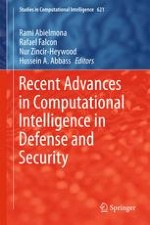2016 | OriginalPaper | Buchkapitel
Evolving Narrations of Strategic Defence and Security Scenarios for Computational Scenario Planning
verfasst von : Kun Wang, Eleni Petraki, Hussein Abbass
Erschienen in: Recent Advances in Computational Intelligence in Defense and Security
Aktivieren Sie unsere intelligente Suche, um passende Fachinhalte oder Patente zu finden.
Wählen Sie Textabschnitte aus um mit Künstlicher Intelligenz passenden Patente zu finden. powered by
Markieren Sie Textabschnitte, um KI-gestützt weitere passende Inhalte zu finden. powered by
